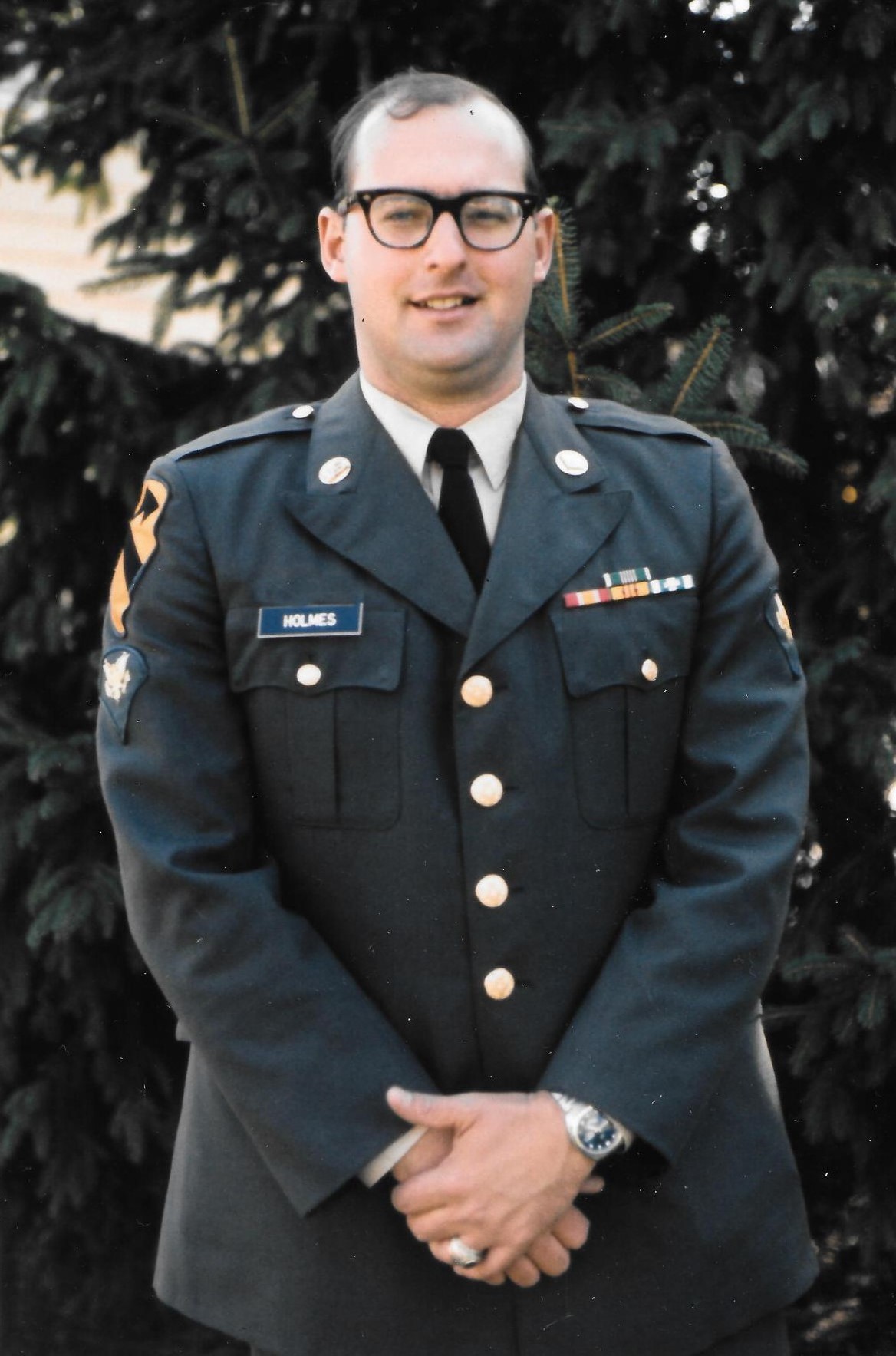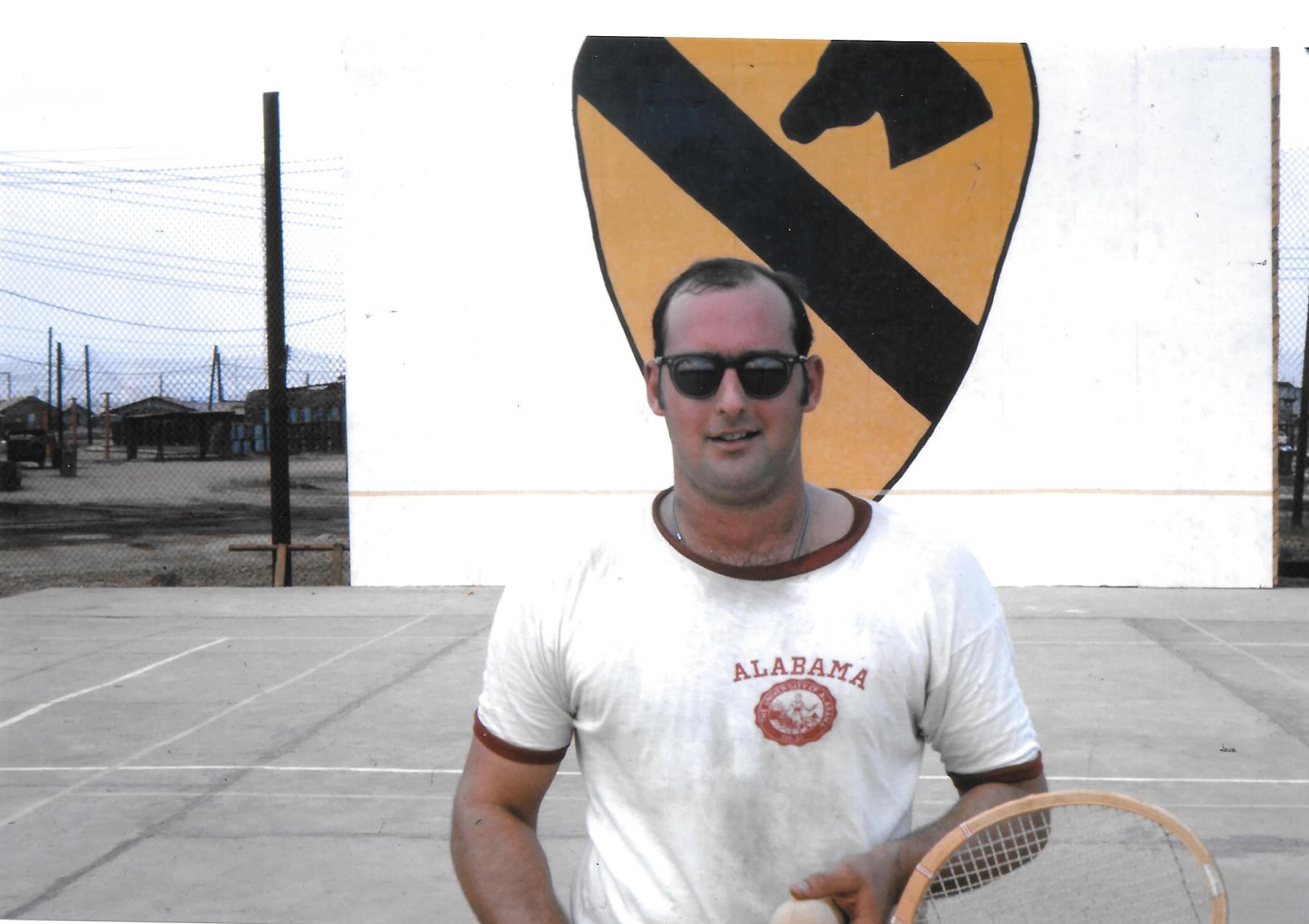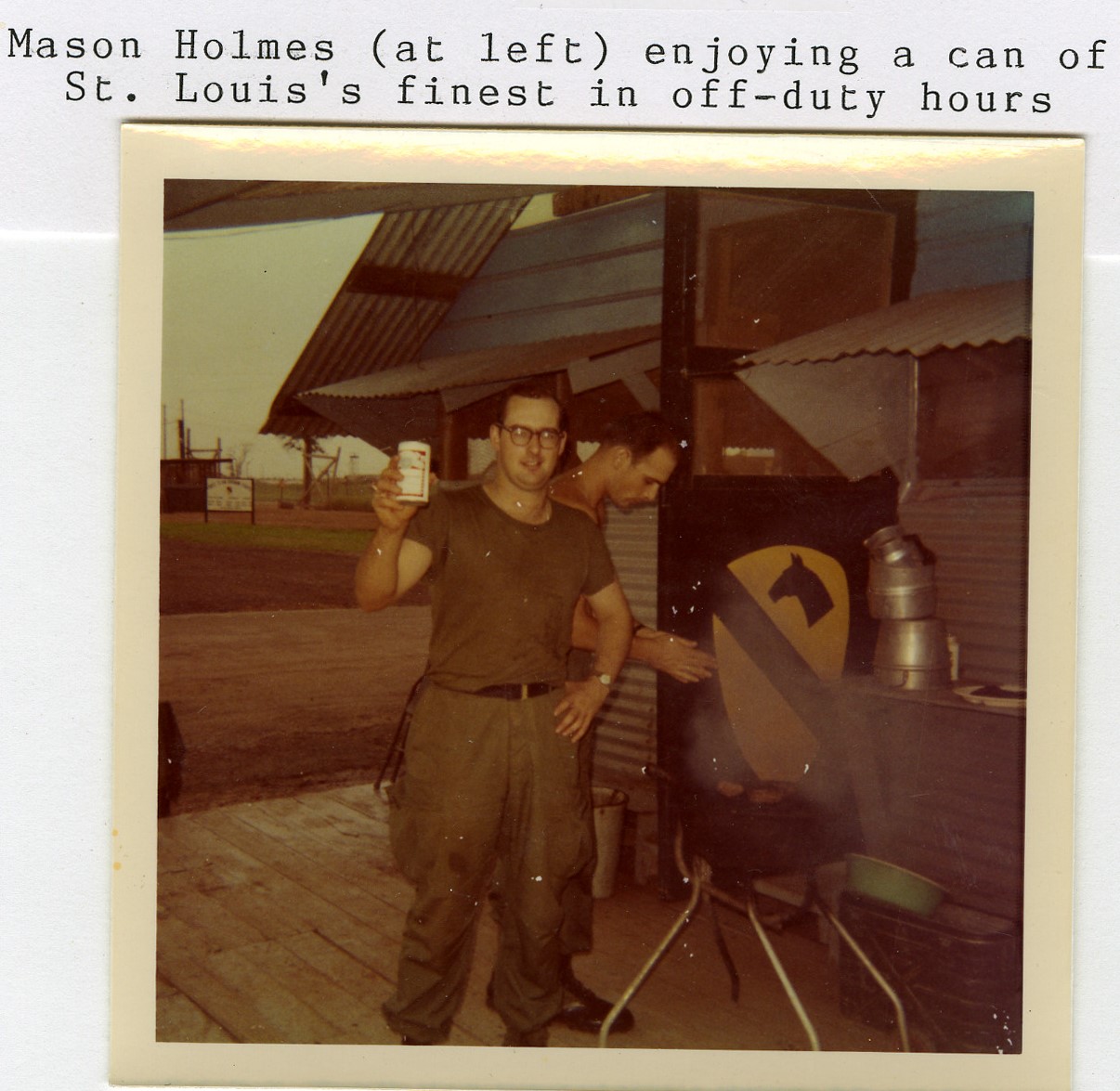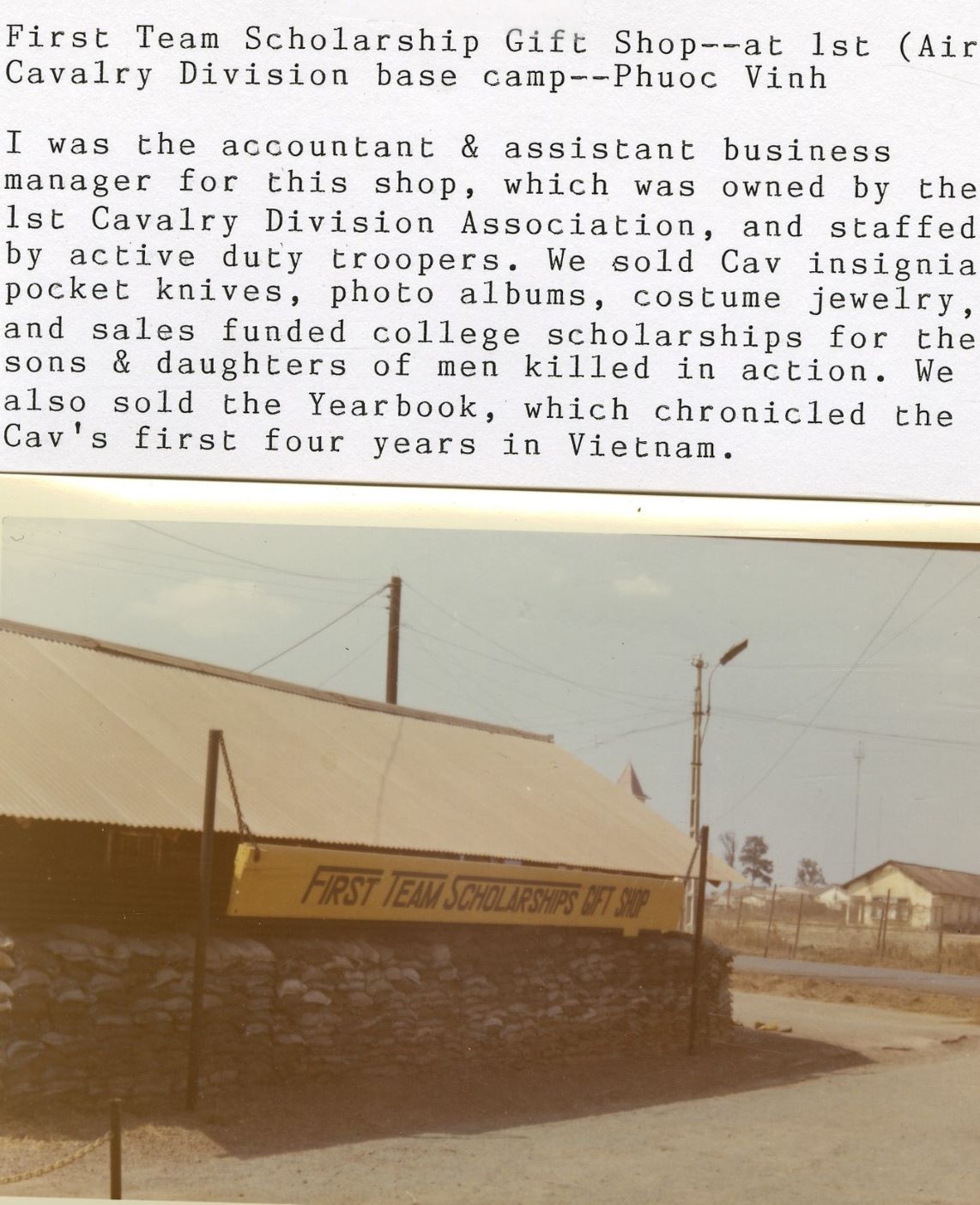Record date:
Mason Holmes, SP-4
What was it like to carry out professional duties on a Vietnam base where mortar attacks were to be expected daily? Although it takes about five military personnel to support one combat soldier during a war, those in support roles are often overlooked. SP-4 Mason Holmes redresses this lacuna by sharing his story.
Born and raised in a suburb of Buffalo, New York, Mason grew up in a middle-class neighborhood. Raised by parents who were college-educated and having had university-oriented peers in high school, Mason, too, chose an academic route. He studied at Duke University, focusing on business and accounting studies. Like most of his peers, he chose this direction rather than a military one, noting however that his parent’s generation, some of whom were World War II veterans, was highly patriotic.
Knowing that the draft would find him soon, Holmes decided to volunteer for service after he was classified 1A, Available for Service, in 1969. Indeed, after his graduation, he was assigned to Company E, 5th Battalion, 2nd Brigade Combat Team to do basic training at Fort Dix, New Jersey. Since he scored well on aptitude tests administered during, “Zero Week”, the first week of boot camp, Holmes was allowed to name his preferred three fields: intelligence, finance, and artillery. Severe fall allergies and the testing of his rifle shooting on a dreary day when he was wearing sunglasses (since his regular glasses were broken) skewed the results. In short, the Army assigned Holmes to work in the Post Finance Office, as permanent party, at Fort Dix. Mason also received more training and carried out guard duty, and KP. He did have some free time to socialize with military buddies and visit family in Buffalo and friends in nearby New York City.
Still and all, he knew that being shipped off to Vietnam was imminent, and in preparation qualified to use an M-16 days before he was shipped out. After the first stop was Fort Lewis, Washington, he and the soldiers were flown to Cam Ranh Bay, Vietnam. His olfactory senses were assaulted by unfamiliar smells after they landed. He was next stop was at Biên Hòa where he and the others were transfixed by seeing a U-2 spy plane. Holmes was puzzled to learn there that he had been assigned to the Public Information Office at Phước Vĩnh Base Camp, north of Biên Hòa. Once there, it was clarified that he would use his skills as an accountant to work at the First Team Scholarship Gift Shop for the 1st Cavalry Division and that he was now assigned to the 1st Air Cavalry Division.
While initially assigned to the 15th Administration Company (15th Admin), he was working for the Headquarters & Headquarters Company, Division Public Information Office(HHC, Div. PIO) for his eventual assignment.
Although SP-4 Holmes had what one might consider a civilian-like job, and although Phước Vĩnh was the Headquarters base camp of the 1st Cavalry Division in the rear, there was no doubt that he was in a combat zone. Mortars were to be expected early in the morning or in the evening when the local Vietnamese employees would not be on the base. Indeed, one night in March 1971, he and about sixty other men frequenting the Enlisted Men’s Club were subject to a particularly vicious mortar attack. He attributes the preservation of lives to a quick-thinking Donut Dolly, named Tina who commanded everyone to lie down, thus preventing a stampede or being hit by a mortar that she correctly predicted would be aimed at the other side of the club.
In addition to working on the base, he occasionally was transported by helicopters such as the LOACH to make deposits, at Biên Hòa or Sông Bé or to more exposed places such as Fire Support Base “Buttons” near the Cambodian border.
The distinction between friend and foe was blurry so he had no desire to meander out of the base. He does recall one exception when he and some guys drove from Sông Bé, to the countryside so that they could purchase crossbows used by Montagnards, indigenous people, and US allies. He realized after the fact that they could have been ambushed.
In this interview, SP-4 Holmes also vibrantly describes the physical base, social stratification, race relations, letter-writing, and leadership. He also recalls how he gained perspective by listening to soldiers who returned from combat both at Phước Vĩnh and at Fort Dix.
Thanks to the US’s lessening involvement in the Vietnam War, Holmes’ discharge was pushed up to April 16, 1971, with him out-processing in San Francisco. Before returning to Buffalo, he visited family and friends around the country. While his family was supportive, job prospects there were poor so Holmes moved to Chicago where he found employment. A lot of his career entailed working with defense contractors.
Holmes reflects upon the nature of different veteran groups. He has ‘found his home’ as an officer of Sheridan’s Cavalry Chapter of the 1st Cavalry Division Association since 2003. Re-connecting with troopers who valued his “having been in the circus” and as well as his growing understanding of the division’s history, instilled in Holmes a sense of pride after years of downplaying his service. His perception of the war also changed over the years after having read widely and viewed documentaries, noting that the US did not understand the tenacity of the enemy.
Holmes supports the idea of national service either in the military or in social institutions to cultivate patriotism. He cautions against excessive financial incentives offered to soldiers in today’s voluntary armed forces before proving themselves first. Ultimately, he hopes that the divide between the military and civilians since the draft ended will narrow.
Holmes has two boys from his previous marriage, one of whom had enlisted in the U.S. Army Reserves. Sadly, the Reservist died of an accidental drug overdose at age twenty. Holmes is now living with Vivian Derden, the mother of two Marines, in Texas and continues to be active in veterans groups.

















